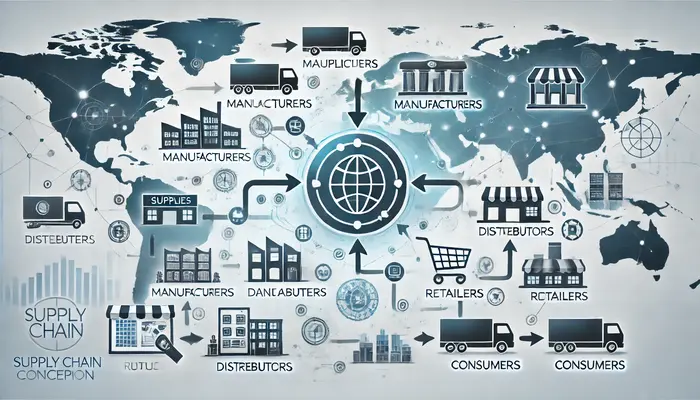In the world of commerce, especially within supply chains, the terms “wholesaler” and “distributor” often get used interchangeably, but they serve different roles. Understanding the differences between them can help businesses make better decisions when sourcing products and determining the right partners for their needs. In this post, we’ll explore the distinctions between wholesalers and distributors, while clarifying key concepts related to wholesale trade.
What is Wholesale Trade?
Wholesale trade refers to the business of selling goods in large quantities at lower prices to retailers or other intermediaries rather than directly to consumers. Wholesale marketing revolves around moving large volumes of products efficiently to resellers. Wholesalers typically offer lower prices, which is where the concept of a “wholesale price” comes into play.
Wholesale Price Definition
A wholesale price is the price a wholesaler charges to retailers or businesses when they buy in bulk. These prices are significantly lower than retail prices because the buyer purchases large quantities. The wholesale price definition is straightforward: it’s the cost that retailers pay, allowing them to sell the product to consumers at a marked-up retail price, thereby making a profit.
Wholesale Price vs Retail Price
To better understand the difference between wholesalers and distributors, it’s essential to grasp the wholesale price vs retail price concept. Wholesale prices are what businesses pay for products in large amounts. Retail prices, on the other hand, are what consumers pay when purchasing individual items. The gap between wholesale vs retail price allows retailers to cover their operating costs and make a profit.
Wholesaler vs Distributor: The Key Differences
Now, let’s dive into the differences between wholesalers and distributors.
1. Role in the Supply Chain

Role in the Supply Chain
- Wholesaler: A wholesaler buys goods in large quantities directly from manufacturers and sells them to retailers. They generally don’t engage in direct sales to consumers. Wholesalers typically store vast inventories and focus on bulk transactions, passing on cost savings to retailers.
- Distributor: A distributor serves as a middleman between manufacturers and wholesalers or retailers. Distributors often have exclusive agreements with manufacturers, meaning they are the sole channel for distributing a product within a specific region. They handle marketing and may even provide after-sales service to ensure product availability and customer satisfaction.
2. Level of Involvement
- Wholesaler: Wholesalers usually focus on the logistics of bulk buying and selling. They don’t play a major role in branding or product promotion.
- Distributor: Distributors, in contrast, take on a more active role in marketing and promoting the products they distribute. They may also offer services like training retailers on how to sell the product or providing technical support.
3. Pricing Structure
- Wholesaler: Wholesalers operate by purchasing in bulk at a lower wholesale price, then marking up those products slightly when reselling them to retailers. They are mainly concerned with price negotiations to ensure they can offer competitive rates to their clients.
- Distributor: Distributors, on the other hand, often operate on a margin that includes not only the wholesale price but also compensation for their added services. Therefore, distributors may have more influence over final retail pricing.
Abbreviation for Wholesale
In the business world, the abbreviation for wholesale is typically “whsl” or “whse.” You’ll often see these abbreviations in pricing lists, inventory sheets, and other documents related to supply chain management.
Wholesale Marketing: How It Works

Wholesale Marketing
Wholesale marketing is all about volume. Businesses involved in wholesale trade often use a strategy focused on selling large quantities of goods quickly. This differs from retail marketing, which targets individual consumers. Wholesale marketing tends to be more B2B (business-to-business), leveraging relationships with retailers and resellers to push products through the supply chain efficiently.
Conclusion
In summary, the difference between a wholesaler vs distributor lies in their role within the supply chain and the services they provide. While wholesalers focus primarily on bulk purchasing and selling at the wholesale price, distributors take on additional responsibilities such as marketing, customer support, and sometimes exclusive distribution rights. Both play crucial roles in moving products from manufacturers to consumers, but understanding their differences can help businesses make more informed decisions about their supply chain strategies.
Whether you’re exploring what is a wholesale price, curious about what is wholesale trade, or deciding between a wholesaler vs distributor for your business, knowing these distinctions will give you the insight needed to navigate the complex world of wholesale trade.
Also Read: Amazon FBA: What It Means, How It Works, and the Costs Involved
FAQs:
Q 1: What do you call a business that buys goods from producers and sells them to retailers?
A business that buys goods from producers and sells them to retailers is typically called a wholesaler. Wholesalers purchase products in bulk directly from manufacturers or producers and then resell them to retailers at a lower price than the retail value. This allows retailers to stock their stores while offering them room to mark up the price for a profit when selling to consumers.
Q 2: How does the use of intermediaries enable producers to make larger profits?
The use of intermediaries like distributors and wholesalers enables producers to make larger profits by allowing them to focus on what they do best—producing goods. Intermediaries take on responsibilities such as marketing, distributing, and managing relationships with retailers, which can increase the efficiency and reach of product sales. By relying on intermediaries, producers can access broader markets without having to invest heavily in direct sales, warehousing, or logistics, thus driving higher overall sales and profitability.

